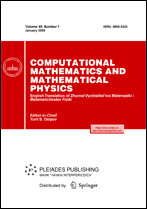|
This article is cited in 3 scientific papers (total in 3 papers)
A generalization of the Karush–Kuhn–Tucker theorem for approximate solutions of mathematical programming problems based on quadratic approximation
V. V. Voloshinov
Institute for Information Transmission Problems, Russian Academy of Sciences, Moscow, Russia
Abstract:
In computations related to mathematical programming problems, one often has to consider approximate, rather than exact, solutions satisfying the constraints of the problem and the optimality criterion with a certain error. For determining stopping rules for iterative procedures, in the stability analysis of solutions with respect to errors in the initial data, etc., a justified characteristic of such solutions that is independent of the numerical method used to obtain them is needed. A necessary $\delta$-optimality condition in the smooth mathematical programming problem that generalizes the Karush–Kuhn–Tucker theorem for the case of approximate solutions is obtained. The Lagrange multipliers corresponding to the approximate solution are determined by solving an approximating quadratic programming problem.
Key words:
approximate solutions, mathematical programming, Karush–Kuhn–Tucker theorem, quadratic programming.
Received: 20.03.2017
Revised: 20.04.2017
Citation:
V. V. Voloshinov, “A generalization of the Karush–Kuhn–Tucker theorem for approximate solutions of mathematical programming problems based on quadratic approximation”, Zh. Vychisl. Mat. Mat. Fiz., 58:3 (2018), 383–396; Comput. Math. Math. Phys., 58:3 (2018), 364–377
Linking options:
https://www.mathnet.ru/eng/zvmmf10690 https://www.mathnet.ru/eng/zvmmf/v58/i3/p383
|


| Statistics & downloads: |
| Abstract page: | 249 | | References: | 52 |
|





 Contact us:
Contact us: Terms of Use
Terms of Use
 Registration to the website
Registration to the website Logotypes
Logotypes








 Citation in format
Citation in format 
